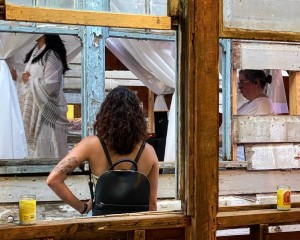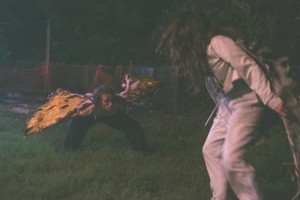Performance With A Purpose: Uplifting West Dallas Stories
ArtandSeek.net June 24, 2021 37On the same street and in the same houses that once defined West Dallas, an echo of the past both recent and long ago will ring out amidst new development in a performance based on true stories from community members.
Artstillery, an arts and service organization, offered its first installment of the immersive performance, Family Dollar, in 2016. During the pandemic, the group revisited the concept. Family Dollar tells the stories of three families in West Dallas trying to survive while struggling with the forces of economic inequality, racism, and gentrification.
Morgana Wilborn is a core team member of Artstillery and one of the writers and directors of Family Dollar.
“The stories are universal… in that they don’t happen in a beginning, middle and end. It’s just capturing these beautiful moments, as if you stop by someone’s house,” Wilborn said. “Their lives go on and continue after we leave.”
Lone Star Baptist Community Church will host the performances in three shotgun houses that were rebuilt as part of this project. Audience members will walk through the houses and watch moments in the families’ lives unfold and intertwine with the story of the West Dallas community as a whole.

Photo by Johnny Rutledge, Courtesy of Artstillery
Wilborn said the immersive aspects of the performance may seem “kooky” at first, but that it creates an entertaining and powerful experience.
“It will feel like a long barbecue party that went on far too long, but you learned a lot of stories from all your cousins in the family reunion,” Wilborn said. “And you will ask yourself, was this part of the real thing? Was that? Where did they get this? I wonder, who said that? And it’ll just be this whole experience. You’re going to feel like you went to totally another land.”
The founder of Artstillery and one of the writers and directors of Family Dollar, Ilknur Ozgur, said that the fact that the stories are based on the real experiences of community members affects more than just the audience. She said that since many of the actors are from West Dallas, they have powerful and authentic performances because of their deep understanding of the history behind the stories.

Photo by Johnny Rutledge, Courtesy of Artstillery
“When it is your narrative and when you have been immersed with Artstillery in training and talking about the stories for six to eight months, it gets pretty easy, in terms of performance,” Ozgur said. “But it’s also extremely emotional because you are speaking the words of actual community members that are there watching their own narratives being uplifted on a public platform.”
Ozgur found the first narrative to raise up shortly after Artstillery began. In 2016, Ozgur asked a developer friend if he had any space she could use. He let offered two shotgun houses that were set for demolition in West Dallas. While the Artstillery team was cleaning the site, they found a journal.
“We started reading it and the wind had hit my hands and the journal fell on the floor and the pages just started turning. As I was watching the pages turn, I said this is our first installment,” Ozgur said. “And what we did was we immersed ourselves in the community, and we went to the Lone Star Baptist Church just down the street. We started tutoring the children there. We started getting to know everyone in the community.”
Two months later, Artstillery performed the first iteration of Family Dollar, which told the story of Shirley, a woman with dementia who was the author of the journal they found. After that first installment, Artstillery pursued other projects, but always came back to Family Dollar.
Paula Hutchinson is a West Dallas community leader and was one of Shirley’s neighbors. She first met Ozgur when she was working on the first installment of Family Dollar. She stayed in contact with Ozgur over the years and connected her with other community members. She even shared her own experience growing up in West Dallas and moving back after serving in the Navy.
She says that she really appreciates that Family Dollar is telling the stories of the West Dallas community after years of people dismissing it as irrelevant.
“It just gives hope that with time. things do change,” Hutchinson. “Once there is an avenue to allow your voice to be heard, once there is enough attention to something that is good, and they are not just depicting us with crime and robbing and mayhem, I can do nothing but show my gratitude and continue to support her organization.”
When COVID-19 came, they decided to expand Family Dollar by interviewing community members and revisiting the original script, to include two families in addition to Shirley’s. For both Ozgur and Wilborn, it was essential to base their writing off of community stories.
“It doesn’t benefit the community, or our organization, to simply pick up a script that’s already been written and try to make that something that fits into today when we have all these new narratives that reflect today sitting right in front of us,” Wilborn said.

Photo by Johnny Rutledge, courtesy of Artstillery
While Ozgur said researching the community wasn’t always easy because of the sensitive nature of some of the topics, she thinks that is where the real work needs to be done.
“And when I look at Family Dollar and the work that we’re doing, it’s an emotional process for me because every community member that we have met just wants to be heard,” Ozgur said. “If you just walk up to a human being and just ask, what is really happening? It’s tremendous the response that you get, and the relationship that you can really create if you are there to listen.”
Ozgur and Wilborn also see this project as a way to preserve a history that is disappearing as development moves into West Dallas. Part of the process of preservation was the decision to move and rebuild the shotgun houses after learning they would be demolished. Even after the performances end, the shotgun houses will remain with resources so that people can watch the parts of performances with VR and read community accounts.
Ozgur hopes that after the audience learns more about the difficulties West Dallas community members face, it will inspire them to help make policy changes and fight for social justice. However, in our interview, Ozgur and Wilborn wanted to be clear that “Family Dollar” is not all about the problems and pain.
“This is not trauma porn. I want to be clear about it, this is not to pimp out of our people. This is to uplift and share these aspects,” Wilborn said.
“Yeah,” Ozgur agreed. “And that is the most powerful part.”
Got a tip? Email Elizabeth Kauma at ekauma@kera.org. You can follow her on Twitter @elizabethkauma.
Art&Seek is made possible through the generosity of our members. If you find this reporting valuable, consider making a tax-deductible gift today. Thank you.










